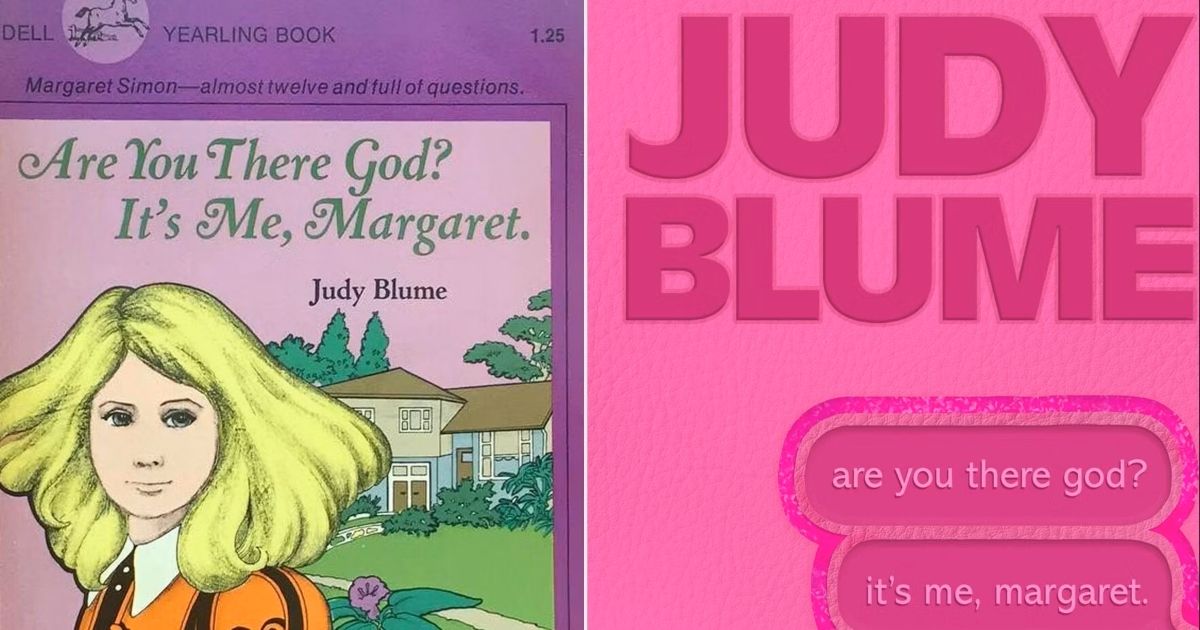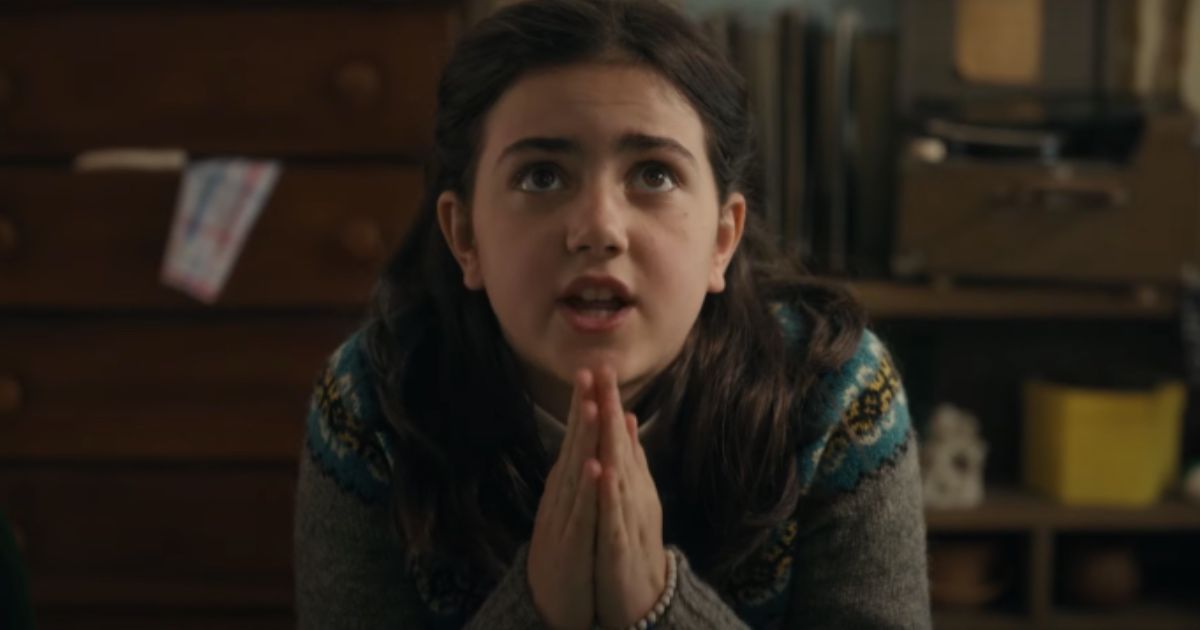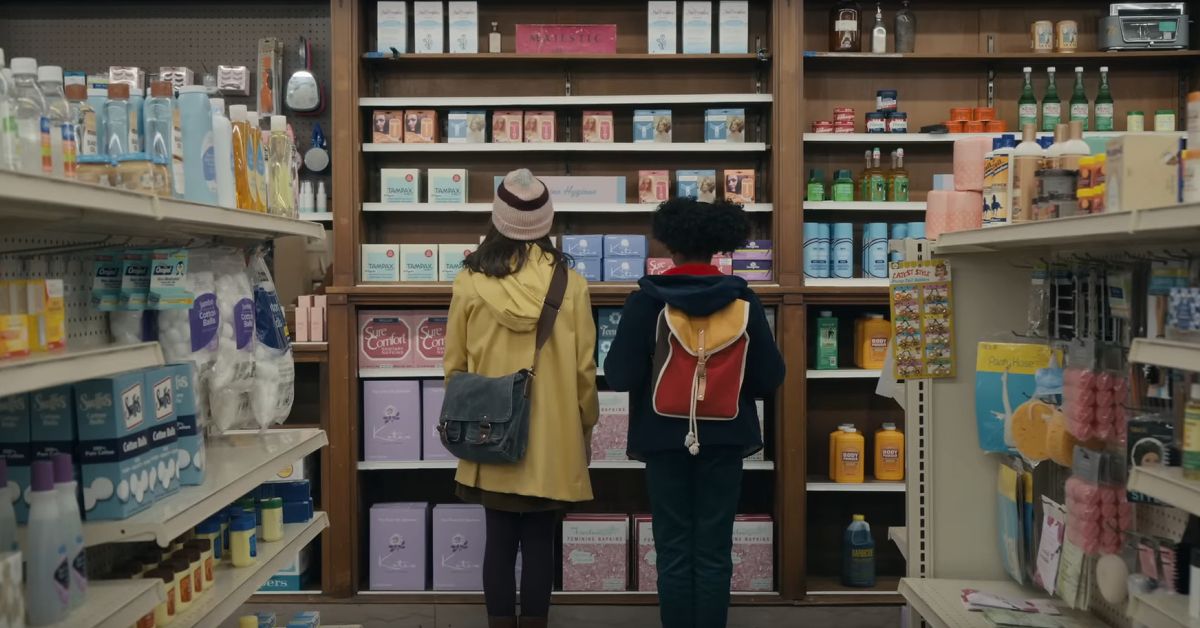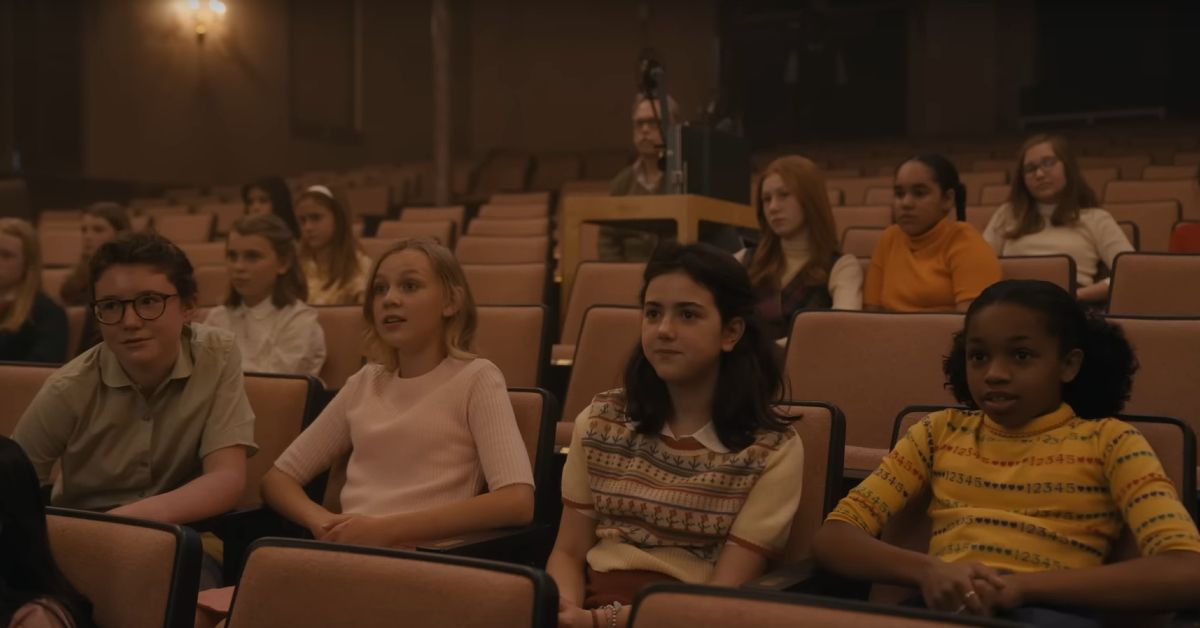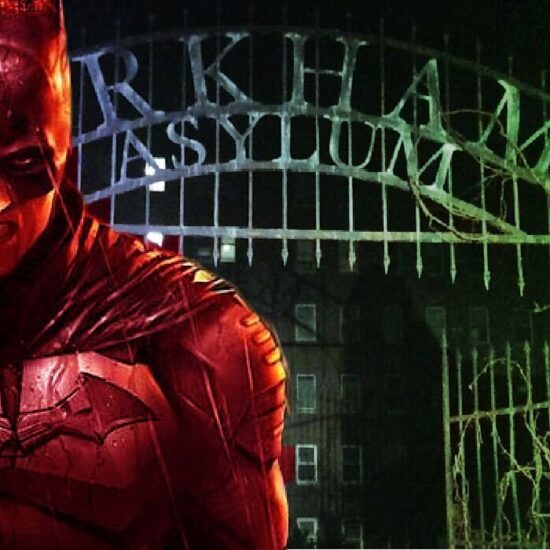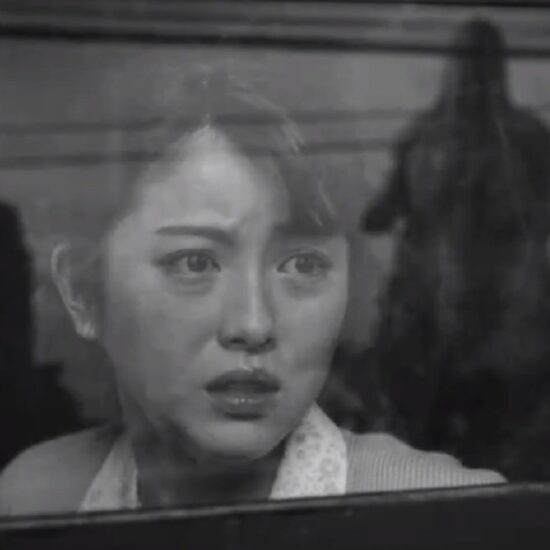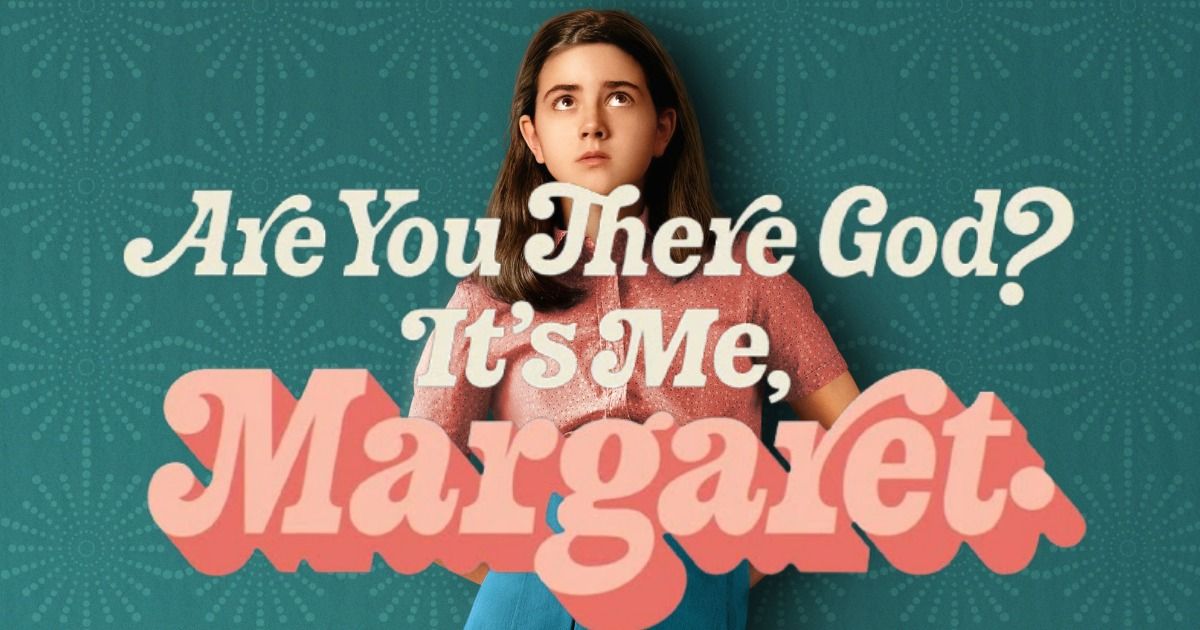
As the lights dim to signal the beginning of the film adaptation of Are You There God, It’s Me, Margaret, fans of the best-selling novel might find themselves whispering in hope, “Are you there, God? It’s me, a fan of this book… Please let this movie be as great as the novel.” Moments into the film, anyone who knows and loves the story of protagonist Margaret Simon will take one look at actress Abby Ryder Fortson’s pure and sprightly face as she moves carefree and happy throughout summer camp, and they will exhale.
Yes, to every one of the over nine million people across the globe who have purchased, read, and loved the novel over the last 50 years, God is also present in the film. So, too, is the spirit of Judy Blume’s incredible work.
Set in the 1970s, and yet timeless, Are You There God, It’s Me, Margaret, by Judy Blume, is about a sixth grade girl who has a Christian mother and a Jewish father and who, as an only child, is forced to grow up without a religious attachment as a result of her parent’s interfaith marriage. They have an agreement to let Margaret find God, or religion, on her own as an adult or if and when she is ever ready.
Instead, when she settles into her new life after her family’s sudden move to New Jersey, Margaret seeks help from and finds God on her own. Facing the awkward and confusing trials of adolescence — such as waiting to get her first menstrual period, her first bra, new friends, missing her grandmother whom she now lives far away from, and her first kiss — it’s all just too difficult to go at alone.
This classic coming-of-age story, inspired by the author’s own life, has been beloved by middle grade readers since its publication debut in 1970. In Blume’s signature style, the book is relatable, unflinching, unapologetic, and delightful as a result. Due to the novel’s frank focus on pre-teen hormones and puberty, however, Are You There God? It’s Me, Margaret was one of the most banned books in history. Regardless of how much it has been criticized, it has been much more embraced by readers for decades and remains a global sensation.
Blume’s loyal fans will be relieved that screenwriter and director, Kelly Fremon Craig (The Edge of Seventeen), has led the novel’s adaptation into what is a gentle and conscientious film with the promise to be as everlasting and cherished as the novel. The film adaptation is sure to be a hit, and stars Rachel McAdams, Abby Ryder Fortson, Benny Safdie, and Kathy Bates.
Thank God, They Got These Things Right
Perhaps the best thing about adapting a novel for film or television is that there is a built-in and proven audience for the story. That also supplies the greatest challenge. Viewers, if they are also fans of the story in its original form, will scrutinize and assess whether the production got it right or not.
Against the grain of a current societal norm to keep the subject of God tucked away in a taboo closet and out of everything from public schools to most film and television series, Are You There God? It’s Me, Margaret kept God in the title and, as in the novel, as nearly a supporting character. Had producers caved to the pressures of not talking about God, there would quite literally not be much of a plot for the movie.
However, and as is also true to the novel, viewers aren’t faced with didactic preaching about religion. Margaret’s journey to get to the root of her struggles with religion is sparked by a class writing assignment in which she realizes that, while she has discovered an ability to find God while she is alone, she struggles to connect with Him in the various religious-based buildings where she searches. The film’s approach to Margaret’s self-journey is not isolating or offensive to any religion, and that is also one of the many reasons why the novel is beloved across all faiths or even those who lack thereof.
It’s Me, The 1970s
Fremon Craig did not delete God from the script and also did not modernize the setting. Instead, Are You There God? It’s Me, Margaret, is rooted right where it belongs, in the 1970s. While it may have been a decade that some may associate with political disorder and the Vietnam War, this movie captures the tranquil texture of more unassuming and easier times.
“There is a cliché of 70s culture comprising Pop Art colors and Yellow Submarine graphics,” said production designer Steve Saklad (Juno). “But that’s only one really narrow part of the 70s. The story we’re telling was set in suburban New Jersey, and that look is very different.”
Fremon Craig noted, too, that she visualized the texture of The Virgin Suicides as she penned the screenplay. Fans of her acclaimed coming-of-age film The Edge of Seventeen will appreciate the tonal comparisons to it and also the matter-of-fact placement of details throughout. Frame by frame, there is always something to take note of beyond the actors and the lines being spoken. There are Tab sodas on the table, Keds sneakers, a summer camp trunk, a typewriter, and plenty more subtle touches throughout.
A choice had to be made regarding whether to deviate from the original story. The greatest attribute to this adaptation is that it does not. Instead, it does what truly great adaptations do. Like an enchanted awakening, it simply breathes life into the pages and lets the story live on screen. Scene by scene, the story unfolds precisely as readers have imagined.
Improving Upon Blume’s Book
Still, part of the goal of an adaptation is to ensure that there is enough wish fulfillment for fans hoping that the story still rings true while also ensuring that enough is added to attract an even wider audience from the film world. How does one improve upon an established classic? Is it even possible?
Margaret’s mother Barbara, portrayed by Rachel McAdams, has a story arc that — due to the limitations of the novel’s first-person narrative — readers didn’t get to see, but audiences will. Hers is a fully fleshed out journey due to the omniscient ability of a film’s approach. Barbara’s struggles are notably parallel to Margaret’s. While trying to help her daughter navigate life, Barbara, too, is at times awkward and indecisive and unsure, searching for ways to stand up for herself among her peers and, yes, even to find her place in the world. Much like Margaret, she is a beloved character because of all of her imperfectness.
In an unexpected but refreshing and appreciated twist, another unexpected improvement upon Blume’s classic novel’s plot, is the re-imagining of several of the characters’ ethnicities. While Margaret, Nancy, and Gretchen are visually spot on as described and imagined from the book, the fourth best-friend in the book, Janie, is portrayed by actress Amari Alexis Price, who is African-American, unlike in the novel.
Additional re-imagining of the race of characters as African-American include Echo Kellum (Key & Peele) in the role of Mr. Benedict and JeCobi Swain (Home Economics) in a charming portrayal as Freddy. An ethnically ambiguous Moose Freed is portrayed by Aiden Wojtak-Hissong (I Am Not Okay With This), to round out the production’s choice to embrace diversity.
While the themes of Blume’s novel have always been universal — and most pre-teens can relate to the angst that Margaret endures — it was only Blume’s novel, Iggie’s House, where non-white characters distinctly appeared. Whereas most fans of Blume’s work have enjoyed her stories without the burden of feeling isolated, it is a welcomed improvement to see the adaptation’s attention to inclusivity in an unforced but intentional way.
Another deliberate choice was to show readers exactly how to do the breast-enhancing exercise that the group of girls does in hopes of speeding puberty along. This, so they can hurry up and look like the women in Playboy magazine.
“When you read the book, everybody has their own interpretation of how the ‘I must—I must—I must increase my bust’ exercise is done,” Fortson said. “We tried so many variations of it; when Judy finally taught us the right way, it was like, ‘Oh, oh, that makes so much sense!’ We were all laughing and doubling over.”
Thank God for These Special Touches
The cast of Are You There God? It’s Me, Margaret is stellar and yet, despite the casting of larger than life actors such as Rachel McAdams, Kathy Bates, and Benny Safdie, the cast blends as an ensemble interwoven as smooth and as cool as the soundtrack which ushers in scenes and transitions with clap-along-energy. From Katherine Mallen Kupferer’s (Widows) picture-perfect performance as Gretchen, to Judy Blume’s cameo appearance (credited as Neighbor Walking Dog #1), every actor’s presence is allowed to count in this film.
In addition to the winning and seamless portrayal of Abby Ryder Fortson’s as Margaret alongside McAdams as her mother, there are quite a few standout performances to note. Kathy Bates, as Margaret’s grandmother, Sylvia Simon, could steal every scene she is in if not for her keen ability to let the talented cast in which she shares scenes with shine as well. Every moment where Bates is on-screen is unsurprisingly memorable.
Fans of the novel will appreciate the true-to-character excellent performance from Elle Graham (The Walking Dead) as Nancy Wheeler. She isn’t politically or socially or even virtuously correct in her choices. She says what’s on her mind without hesitation. “Oh, you’re still flat,” she said to Margaret after she had changed into a bathing suit on the first day they met. And yet, with such subtle care for the subtext of intention, viewers will find Nancy’s character, just as Margaret does, quite likable.
What if You’re Not a Fan (Yet)?
It’s hard to say for sure if viewers outside the novel’s dedicated readers will appreciate Are You There God? It’s Me Margaret in its stand-alone film position as much as those who both know and love the novel surely will.
Viewers in search of a coming-of-age feel-good movie with sprinkles of grit in its realness and a warm blanket of tenderness over its approach to complicated emotions — much in the vain of Stand By Me, Dazed and Confused, and The Edge of Seventeen — will find a familiar place to nestle up and enjoy a great film with this instant classic adaptation.
Are You There God? It’s Me, Margaret is produced by Gracie Films’ Academy Award® winner James L. Brooks (Best Picture, 1983 – Terms of Endearment), alongside Julie Ansell, Richard Sakai, Kelly Fremon Craig, Judy Blume, Amy Lorraine Brooks, Aldric La’auli Porter, and executive produced by Jonathan McCoy. A Gracie Films production, Lionsgate is releasing Are You There God? It’s Me, Margaret on Friday, April 28, 2023.







